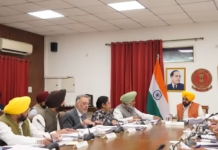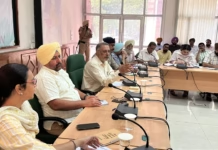2020 started with job openings; Punjab cabinet okays filling of 3186 posts in schools
KI Singh/ royalpatiala.in/ Chandigarh
The Punjab Government has decided to fill up as many as 3186 posts of various cadres in teaching and non-teaching staff in schools.
The Cabinet, led by Chief Minister Captain Amarinder Singh, on Tuesday approved the School Education Department proposal to this effect.
The move will help plug a major gap in the school staff, thereby improving the standards of education, an official spokesperson said after a meeting of the Cabinet.
During the meeting, the Chief Minister underlined the need for serious relook at the school curriculum from the point of making students job-ready. Pointing out that vocational courses had been introduced for senior classes in various fields, such as hospitality & mobile phone repair etc, he stressed on the importance of more thrust on vocational teaching.
In line with the proposal of the School Education Department, the Cabinet gave nod to fill up 132 posts of Deputy District Education Officer, Principal of Government Senior Secondary Schools, 311 Headmasters/Headmistresses, 2182 masters/mistresses in various subjects, 32 Block Primary Education Officers (BPEOs), 500 Elementary Trained Teachers, 04 law officers and 25 legal assistants.
The annual financial implication of the move, for the first three years during the probation period, would be Rs. 42 crore per annum approximately. However, once the probation period is over and the employees are given the full scale, the annual financial implication will be Rs. 197 crore per annum approximately, said the spokesperson.
Notably, all these posts, except Principals, Headmasters and BPEOs, would be filled up through the Directorate of Recruitment, already set up in the Department since October 12, 2015. The posts of Principals, Headmasters and BPEOs shall be filled up through the Punjab Public Service Commission.
In order to utilise the services of clerks optimally, the Department has proposed to follow the methodology for rationalisation of clerks to dispose of the official work expeditiously as well as efficaciously.













